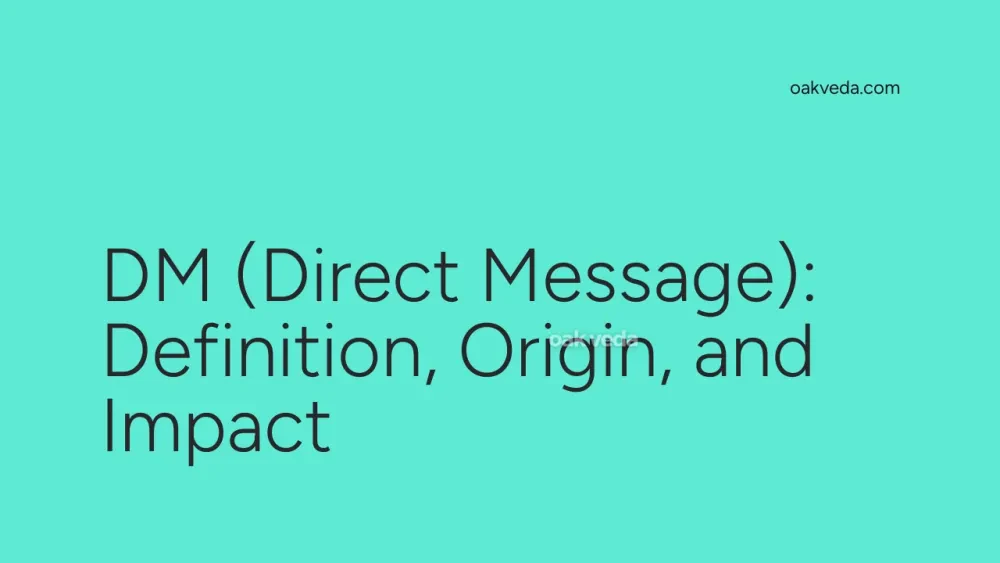
What is DM?
DM, short for Direct Message, is a private communication feature found on most social media platforms. It allows users to send one-on-one messages to other users without making their conversation public. DMs provide a more intimate and personal way to interact within the broader social media ecosystem.
Origin and Development of DM
The concept of direct messaging in social media can be traced back to the early days of online communication. However, it gained prominence with the rise of popular social networks:
- 2006: Twitter introduced DMs as a core feature
- 2013: Instagram added Instagram Direct for private messaging
- 2015: Facebook separated Messenger as a standalone app for direct communication
As social media evolved, DMs became an integral part of user experience, offering a blend of instant messaging and social networking.
How DM Works
Direct messaging typically functions as follows:
- Users access the DM feature through a dedicated inbox or messaging icon
- They can initiate a conversation by selecting a recipient from their followers or contacts
- Messages are sent in real-time and can include text, images, videos, and other multimedia content
- Conversations are private and visible only to the participants
- Many platforms offer read receipts and typing indicators for a more interactive experience
Types or Variations of DM
While the core concept remains the same, different platforms offer unique DM features:
- One-on-One DMs: The most common type, involving two users
- Group DMs: Allow multiple users to participate in a single conversation
- Disappearing Messages: Some platforms offer temporary DMs that vanish after being viewed
- Business DMs: Specialized features for brands to communicate with customers
Popular Examples of DM
DMs are widely used across various social media platforms:
- Twitter DMs: Known for their simplicity and integration with public tweets
- Instagram Direct: Offers a seamless blend of photo sharing and private messaging
- Facebook Messenger: A standalone app with extensive features like video calls and mini-apps
- LinkedIn InMail: Professional-focused direct messaging for networking and recruitment
Impact of DM on Social Media Culture
Direct messaging has significantly influenced social media behavior:
- Enhanced Privacy: Users can have personal conversations without public scrutiny
- Relationship Building: DMs facilitate deeper connections between users
- Customer Service: Brands use DMs for personalized customer support
- Influencer Collaborations: DMs are often the starting point for brand partnerships
- News Gathering: Journalists use DMs to connect with sources privately
Controversies or Debates Surrounding DM
Despite their popularity, DMs have faced some challenges:
- Privacy Concerns: Questions about message encryption and data protection
- Harassment: DMs can be used for unwanted contact or cyberbullying
- Scams: Fraudsters may use DMs to conduct phishing attacks
- Content Moderation: Difficulties in monitoring private conversations for harmful content
How Brands and Influencers Use DM
DMs have become a powerful tool in digital marketing:
- Personalized Outreach: Brands connect with potential customers individually
- Influencer Partnerships: DMs are used to negotiate and manage collaborations
- Customer Feedback: Companies gather direct, private feedback from users
- Exclusive Offers: Brands send personalized promotions to engaged followers
- Community Building: Influencers use DMs to create closer bonds with their audience
Future Trends Related to DM
The future of direct messaging in social media looks promising:
- AI-Powered Assistants: Chatbots may handle routine DM interactions
- Enhanced Encryption: Improved security measures to protect user privacy
- Cross-Platform Integration: Seamless messaging across different social networks
- Augmented Reality: AR features in DMs for more immersive communication
- Voice and Video DMs: Increased focus on multimedia messaging options
FAQs about DM
-
Are DMs always private? While DMs are designed for private communication, users should be aware of platform-specific privacy settings and potential data breaches.
-
Can I unsend a DM? Some platforms allow users to delete sent messages, but this feature varies and may have time limitations.
-
How can I protect myself from unwanted DMs? Most social media platforms offer settings to control who can send you DMs, such as limiting them to followers only.
-
Can businesses use DMs for marketing? Yes, but they should follow platform guidelines and respect user preferences to avoid being seen as spam.
-
Are DMs replacing other forms of communication? While DMs are popular, they complement rather than replace other communication methods, offering a unique blend of social media connectivity and private messaging.
Direct messaging has revolutionized how we interact on social media, providing a private space within public platforms. As technology evolves, DMs will likely continue to play a crucial role in shaping online communication, offering new ways for individuals and brands to connect in the digital age.
You may be interested in:
- Instagram Algorithm: Definition, Origin, and Impact
- Link in Bio: Definition, Origin, and Impact on Social Media
- Touch Grass: Definition, Origin, and Impact on Social Media
- ION: Definition, Origin, and Impact on Social Media
- Gen Z: Definition, Origin, and Impact on Social Media
- Vlogging: Definition, Origin, and Impact on Social Media

